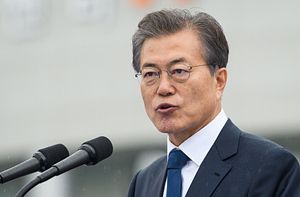A controversy erupted earlier this week over the ostensibly liberal South Korean government’s decision to cut off funding for the U.S.-Korea Institute at the Johns Hopkins School of Advanced International Studies. Critics, including the Institute’s chairman, former ambassador Robert Gallucci, have claimed that the decision stems from the Moon Jae-in administration’s desire to force out USKI Director Jae H. Ku over his perceived conservative leanings.
This comes on the heels of a report which appeared last week in the Joongang Ilbo alleging that the administration had brought political pressure to bear on a number of academics at research think-tanks within South Korea for criticizing the government’s policy toward the North. That list included former State Department official David Straub, who recently left his post as a research fellow with the Sejong Institute in Seoul. The same article also stated that prominent North Korean defectors such as Thae Yong-ho have been sidelined from making public appearances in recent months as North and South Korean relations have entered a phase of reconciliation.
Such allegations are perfectly credible, given that the North Koreans may well have insisted that limiting public criticism of the regime in Pyongyang was their price for playing nice in the run-up to this spring’s scheduled summits with South Korea and the United States. The real shock is that anyone would view these actions as a surprise. For starters, the Moon administration is desperate to keep the positive momentum going that began when Kim Jong-un offered an olive branch in his New Year’s address following months of heightened tension. South Korean attitudes toward their northern brethren have changed markedly since that time, with a majority of the public now, “taking an optimistic view that a directional shift is occurring from war to peace.”
More importantly, government suppression of differing viewpoints in the media and academia is a bipartisan pursuit in South Korea, which makes the Moon administration’s threat to take legal measures against the Joongang Ilbo a predictable, if disappointing, redux of the past. This fact often gets lost in laudatory coverage of South Korea’s democratic transition, and Moon’s designation as a “liberal” in the Western press. Indeed, this simplistic narrative ignores the relevant fact that both of South Korea’s previous “liberal” administrations – that of Kim Dae-jung and Roh Moo-hyun – exerted a heavy hand over the country’s media that often resulted in criticism from international advocates for press freedom.
It is worth highlighting few specific examples. For one, early in his term, Kim came under fire from the non-partisan Committee to Protect Journalists for bringing defamation charges against several reporters and magazine publishers who accused him during the 1997 election of being pro-Communist. He also had the publishers of two of the country’s main dailies, the Chosun Ilbo and Dongha Ilbo, briefly imprisoned for tax evasion in what was viewed in some quarters as a threat to intimidate conservative media.
Roh also had his share of problems with the media during his term, resulting in an increased number of prosecutions under defamation statutes, passage of a bill – later deemed unconstitutional – that sought to limit the market share of the country’s three major conservative dailies, and the implementation of a law governing internet comments, the so-called Real Name Act, which led the advocacy group Reporters Without Borders to list South Korea as a “country under surveillance” in a number of its “Enemies of the Internet” reports. (This law was also eventually ruled unconstitutional in 2012.)
All of this is to say that the behavior of the Moon administration is nothing new, and in fact fits the patterns of governments both liberal and conservative in South Korea. The more concerning issue is an administration that is beginning to show its own clear tendencies toward censorship drawing closer to what is already the world’s most despotic regime. To this point, Moon has advocated the idea of confederation with the North as a first step toward reunification and controversially appointed for his chief-of-staff a man who was jailed in his youth for leading a pro-North student group and who for a time acted as Kim Jong-il’s legal representative in South Korea. Further, in statements that echo the leaders in Pyongyang, Moon has also called for eventual unification “by our nation itself,” without outside interference.
For Seoul, ideology has combined with the pragmatic realization that engaging with North Korea on the regime’s fundamental vision of unification offers the best chance for encouraging Kim Jong-un to follow through on his commitment to denuclearization, and thus avert a preemptive military strike by the United States that could have catastrophic consequences for the entire Peninsula. Until now, the idea of a unified Korea was largely conceptualized to be one in which a collapsing North would be incorporated by a free and democratic South. Yet it is looking far more likely that a new, confederated Korea will be one in which neither side shares the values of a traditional liberal democracy, at least when it comes to the issues of media and academic freedom.
Geoffrey Fattig is an independent research analyst based in Seoul, South Korea.
































